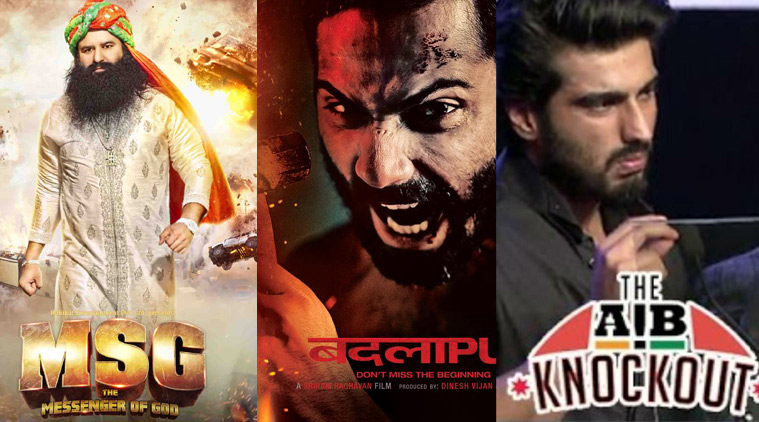Click here to follow Screen Digital on YouTube and stay updated with the latest from the world of cinema.
Censorship Circus
While the industry was still coming to terms with this change, new directives from the Censor Board further fuelled the already agitated industry.
 The new directive sent out by the Central Board of Film Certification last week that bans the use of several cuss words, old names of cities, etc, has not just alarmed the creative people, but has also led to discontent within the board.
The new directive sent out by the Central Board of Film Certification last week that bans the use of several cuss words, old names of cities, etc, has not just alarmed the creative people, but has also led to discontent within the board.
The conundrum started two months ago when members of the Censor Board disapproved the release of the film, MSG: The Messenger(earlier titled MSG: The Messenger of God) as the Censor Board, then headed by Leela Samson, thought the film was promoting superstition, blind faith, self glorification.
However, soon an Appellate Tribunal was appointed and the decision was taken to clear the film, which led to the resignation of many Board members including Samson and the formation of a new Board with film-maker Pahlaj Nihalani as the new Chairman of CBFC (Censor Board of Film Certification).
While the industry was still coming to terms with this change, new directives from the Censor Board further fuelled the already agitated industry. For instance, the Board beeped out the word Bombay from a song by musician Mihir Joshi before clearing it for release on television channels. Soon, a directive was sent out to producers and film-makers by the CBFC, banning over 15 Hindi and 13 English cuss words. The directive also ordered deletion of “violence against women”, double-meaning words, ban on the use of word Bombay and ban on glorifying bloodshed.
And if that was not enough, even the Bombay High Court became a censor after it issued arrest warrants against the members of the film fraternity, in this case Karan Johar, Arjun Kapoor and Ranveer Singh and comedy group, All India Bakchod, over their participation in AIB Roast — an adaptation of an international format where a specific individual is subjected to good-natured jokes at their expense. More ludicrous was the removal of the AIB Roast video from the online space after the entire furor surrounding it.
According to screenwriter, Anjum Rajabali, “We are certainly witnessing a very interesting turmoil in censorship in India.” Rajabali thinks that certain forces within our society have begun attacking every expression of liberalism in a bid to force their definition of Indian culture on the rest. “As soon as the AIB Roast pushed the envelope in terms of irreverence and offence, those forces pounced upon them to set an example. It is going to be very interesting to watch how the judiciary now responds to it,” he remarks.
However, what has surprised the film fraternity is that in this age when the consumption of content is increasingly moving towards the internet where there’s hardly any censorship, such rules are being imposed. “Can the government stop people from watching international videos that are full of the so-called abuses? Is there a policy in place to remove them, or keep an eye on what is being watched?” asks screenwriter-director Zeishan Qadri, who finds everything that is happening really amusing.
“A move with the times is absolutely essential for censorship,” remarks Vivek Rangachari, producer, DAR Motion Pictures, who though he doesn’t want to comment on what has happened over the last couple of weeks, thinks the time is now right for the restruction of not just the Board but also the entire censor categories and processes. “I do believe that the censor board should be a completely independent body with autonomy such as other boards like the Association of Mutual Funds of India (AMFI), Securities and Exchange Board of India ( SEBI), etc. albeit in censoring content. It should be driven by an independent board bereft of any interference,” says Rangachari.
Though film-maker Hansal Mehta echoes similar sentiments, he also confesses to be very cynical about the entire issue. “The government says that it is an autonomous body, but how is it autonomous when the Board is constituted by the Ministry and you fill up the Board with loyalists,” says Mehta, who brings to fore how the directive that bans the use of the expletives has been quoted under the Cinematograph Act of 1952. “When the way forward is to get rid of the archaic Act, prudish norms are being imposed using it as a crutch,” he says.
Calling the directive clumsy and knee-jerk, Rajabali finds it quite meaningless on CBFC’s part to issue the directive. “The purpose of art is also to disturb, to agitate, to shine a torch into the darker areas of our reality, to bring out harsh hidden truths, to expose the dirt that we push under the carpet. Instead of encouraging such cinema, the CBFC tries to smother it. Sure there are guidelines laid out by the I&B Ministry for certification purposes, but those have to be dynamically interpreted by the Board of CBFC, and not be taken literally,” says
Rajabali, who believes that the role of the Board is primarily to keep reinterpreting those guidelines in sync with the evolving nature of Indian cinema and society, and not push it back to the Victorian era! Surprisingly enough, even some of the Board members are appalled at the recent turn of events.
Film-maker Chandraprakash Dwivedi and a Board member of the CBFC who wished to speak as a creative person rather than a member because he would rather the official spokesperson of the CBFC answer and secondly, because everything that has happened is nothing short of bizarre. “We were not consulted before the directive was sent out,” says Dwivedi, who himself is confused about the roles and involvement of the members in the matters of certification. “But a meeting has been called on February 23, which will see the new Board discussing all the issues and concerns for the first time,” informed Dwivedi.
The issues While there are many concerns that need to be addressed, Dwivedi says one of the major issues is to expedite the process of passing a film. “Especially, if the film has gone to the revising committee,” says Dwivedi who highlights how the Appellate for MSG: The Messengerwas formed within a day. “It never happens! Even the formation of the revising committee takes very long. Most of the time the films are reviewed much after they were scheduled to release, putting the films’ future in dark,” he says.
The industry stands unanimous, when most of them say that certification should move to the international categorisation of content such as G, PG, PG-13, R, NC-17 etc. Film-maker Onir remarks, “I had thought the time is ripe to have a ratings system in cinema viewing, but instead of graduating to a newer system, we are talking about directives that puts cuss words like harami and asshole in the same category as Bombay. Suddenly, it is a pervert way of thinking, which makes everything offensive. We are constantly curtailing the art of creativity.”
Rajabali couldn’t agree more. “Unfortunately any sign of progressive thinking is being pulled down by the fear of the radical.
Having said that, creativity should also be socially conscious given the times that we live in and should not infringe on the fundamental right to opinion of others. The censor board needs to evolve to pragmatically deal with these increasingly radical elements on either side of the divide while allowing for genuine opinion and tolerance,” he says.
The way forward In the absence of a united voice, Mehta thinks that the only way to deal with it is to keep making movies that defy the radical norms. “My movies are my tools to fight,” he says. But it isn’t that easy. Members of the film fraternity think that the big and the influential should come together to voice their opinion every time creativity is curtailed. “There should be another committtee comprising of film-makers without the involvement of any CBFC members, which can talk to the Censor Board or the government in a crisis situation. Basically, there has to be a face from our side,” says Qadri.
But Mehta reflects how the industry doesn’t have one single body that talks about the interest of the industry as a whole. “We have the Film Federation of India — nobody knows who has constituted it. They come alive only when India’s Oscar entry is to be decided,” mocks Mehta, also talking about other bodies like the three producers association — Indian Motion Pictures’ Producers Association, Western India Film Producers’ Association, and The Film and Television Producers Guild of India — that are at loggerheads with each-other most of the time. “They are competing with each-other to get more members and to hold award functions. There is no unity! Then, there’s
the Director’s Association that is headed by Ashoke Pandit, who is a member of the CBFC and promotes the ideologies of the ruling party,” says Mehta without mincing words.
However, most are looking at this crisis as a challenge to rise and fight it. “The next few years will depend on how we respond to these directives,” says Rajabali, as he concludes, “Firstly, the job of the CBFC should be restricted to certifying films based on which age they are appropriate for. (Once a film is certified A, there is virtually no need to cut anything.) Secondly, the film industry should be involved in certification decisions, and eventually, this job should be handled entirely by a film industry body.
Thirdly, I do wish that the film industry now unites and speaks in one strong decisive voice against every attempt on anyone’s part to curb creative freedom.”
- 01
- 02
- 03
- 04
- 05

































